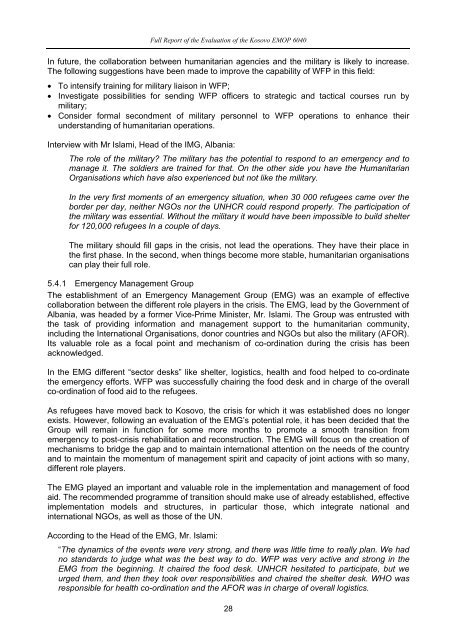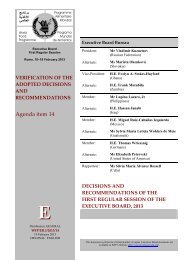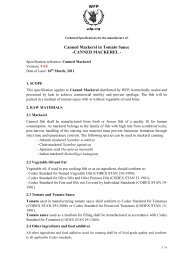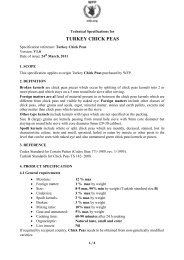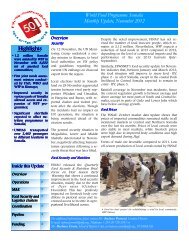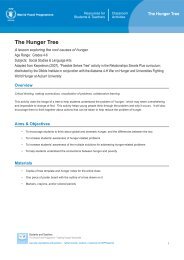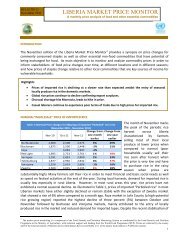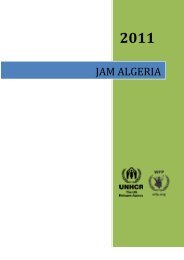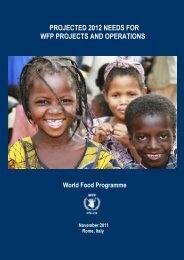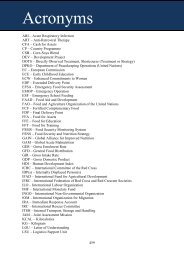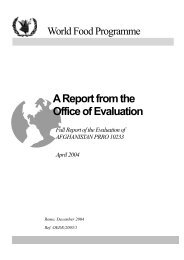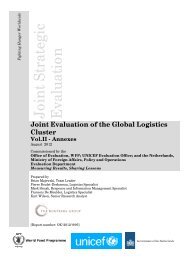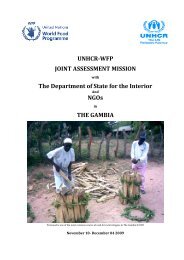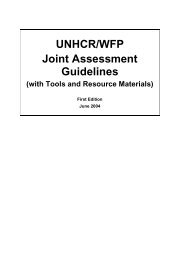Full Report - WFP Remote Access Secure Services
Full Report - WFP Remote Access Secure Services
Full Report - WFP Remote Access Secure Services
Create successful ePaper yourself
Turn your PDF publications into a flip-book with our unique Google optimized e-Paper software.
<strong>Full</strong> <strong>Report</strong> of the Evaluation of the Kosovo EMOP 6040<br />
In future, the collaboration between humanitarian agencies and the military is likely to increase.<br />
The following suggestions have been made to improve the capability of <strong>WFP</strong> in this field:<br />
• To intensify training for military liaison in <strong>WFP</strong>;<br />
• Investigate possibilities for sending <strong>WFP</strong> officers to strategic and tactical courses run by<br />
military;<br />
• Consider formal secondment of military personnel to <strong>WFP</strong> operations to enhance their<br />
understanding of humanitarian operations.<br />
Interview with Mr Islami, Head of the IMG, Albania:<br />
The role of the military? The military has the potential to respond to an emergency and to<br />
manage it. The soldiers are trained for that. On the other side you have the Humanitarian<br />
Organisations which have also experienced but not like the military.<br />
In the very first moments of an emergency situation, when 30 000 refugees came over the<br />
border per day, neither NGOs nor the UNHCR could respond properly. The participation of<br />
the military was essential. Without the military it would have been impossible to build shelter<br />
for 120,000 refugees In a couple of days.<br />
The military should fill gaps in the crisis, not lead the operations. They have their place in<br />
the first phase. In the second, when things become more stable, humanitarian organisations<br />
can play their full role.<br />
5.4.1 Emergency Management Group<br />
The establishment of an Emergency Management Group (EMG) was an example of effective<br />
collaboration between the different role players in the crisis. The EMG, lead by the Government of<br />
Albania, was headed by a former Vice-Prime Minister, Mr. Islami. The Group was entrusted with<br />
the task of providing information and management support to the humanitarian community,<br />
including the International Organisations, donor countries and NGOs but also the military (AFOR).<br />
Its valuable role as a focal point and mechanism of co-ordination during the crisis has been<br />
acknowledged.<br />
In the EMG different “sector desks” like shelter, logistics, health and food helped to co-ordinate<br />
the emergency efforts. <strong>WFP</strong> was successfully chairing the food desk and in charge of the overall<br />
co-ordination of food aid to the refugees.<br />
As refugees have moved back to Kosovo, the crisis for which it was established does no longer<br />
exists. However, following an evaluation of the EMG’s potential role, it has been decided that the<br />
Group will remain in function for some more months to promote a smooth transition from<br />
emergency to post-crisis rehabilitation and reconstruction. The EMG will focus on the creation of<br />
mechanisms to bridge the gap and to maintain international attention on the needs of the country<br />
and to maintain the momentum of management spirit and capacity of joint actions with so many,<br />
different role players.<br />
The EMG played an important and valuable role in the implementation and management of food<br />
aid. The recommended programme of transition should make use of already established, effective<br />
implementation models and structures, in particular those, which integrate national and<br />
international NGOs, as well as those of the UN.<br />
According to the Head of the EMG, Mr. Islami:<br />
“The dynamics of the events were very strong, and there was little time to really plan. We had<br />
no standards to judge what was the best way to do. <strong>WFP</strong> was very active and strong in the<br />
EMG from the beginning. It chaired the food desk. UNHCR hesitated to participate, but we<br />
urged them, and then they took over responsibilities and chaired the shelter desk. WHO was<br />
responsible for health co-ordination and the AFOR was in charge of overall logistics.<br />
28


